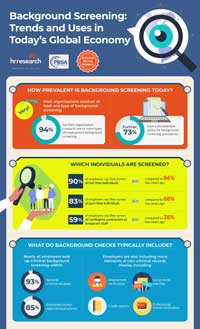
Could criminal monitoring finally be catching on?
HR.com has released its 2020 background screening trends survey, sponsored by the Professional Background Screeners Association (PBSA), and some of the key changes include a jump in the types of employees screened and an increase in the frequency of those screened. These results show the use of criminal monitoring is still on the rise, which could be attributed to the growth in the gig economy or just the increased risk mitigation of traditional organizations.
This monitoring trend is likely to continue during the COVID crisis, which has a seen a rise in the number of other gig economy jobs, just as home meal and grocery delivery workers. More people may be working from home, but for those who have to go to work, they may be bringing in help to care for children and the elderly, since schools and assisted living homes could continue to be high risk health options for some. Home workers and gig economy workers tend to be areas where the criminal monitoring trend is more present and growing. I see this trend only rising in the coming years.
On another note, overall crime may have declined in most major cities during the COVID lockdown period. But when a vaccine is released, and the lockdowns ultimately go away and businesses open back up, chances are crime will rise again. Which would also make criminal monitoring a good idea for the future.
The survey, titled “Background Screening: Trends and Uses in Today’s Global Economy,” not only saw a 4 percent increase in the number of employers who stated they screen “All full-time employees,” at 90 percent up from 86 percent in 2019, but also saw a pretty drastic boost in the number of employers who screen all other non-full-time workers.
The survey revealed 83 percent of employers are now screening all “part-time” staffers, up from 67 percent in 2019. And that increase is also present in the number of “contingent, contract and temporary staff” screened, which jumped to 59 percent from the previously recorded 27 percent. The same goes for volunteer and unpaid workers, who are now screened by 44 percent of the employers surveyed, up from 18 percent the previous year.
In addition to the increase in the types of staff screened, the survey shows a 3 percent increase for the past two years in the frequency of screening. This year 12 percent of employers surveyed said they conduct screening annually or more frequently than they have before. That jumps up from 9 percent and 6 percent in 2019 and 2018, respectfully.
Employers, according to survey, are also including more components in the employment screens for “all candidates,” namely verifications. In 2020, 60 percent of the subjects surveyed said they include employment verifications in their searches for all employees, up from 43 percent in 2019. And education verifications saw a rise to 40 percent, up from 28 percent the previous year.
High unemployment rates, which have been prevalent during the 2020 COVID crisis, will always lead to more and more people fibbing on resumes to compete for jobs. Checking backgrounds for more than just criminal activity is a good idea for organizations who want to hire the best people.
Social media searches may continue to be a compliance nightmare for some organizations, which would explain why only 11 percent of companies surveyed said they include social media searches for all candidates. But that number was up 5 percent from 2019, which shows some companies may be opening up to the idea of this type of screening.
The biggest challenge for companies when it comes to employment screening is the length of time to complete a background report – 66 percent of respondents agreed. HR.com and PBSA attribute the issue to more court systems excluding personal identifying information on records, making it increasingly difficult to confirm the accuracy of a report.
The companies polled vary in size, with 37 percent having fewer than 100 employees, and 29 percent having between 100 and 499. More than half of the entities represented were privately held (54 percent), and 18 percent were listed as non-profit organizations.
The main take-away from the 2020 survey is simple – more companies are screening more types of employees, and on a more frequent basis. This is proof the employment screening industry still offers a much-needed service to the business and non-profit world.
Download the HR.com/PBSA Survey Infographic here.

Camille Gamble worked as Vice President of Marketing and Support for startup Verified Person Inc., acquired by Sterling Talent Solutions in 2016. Her experience also includes leading the marketing efforts for startup criminal database provider Rapsheets.com, acquired by ChoicePoint in 2004. With her background at these screening companies she brings nearly 20 years of consumer reporting agency experience to Accio Data as a business developer.
